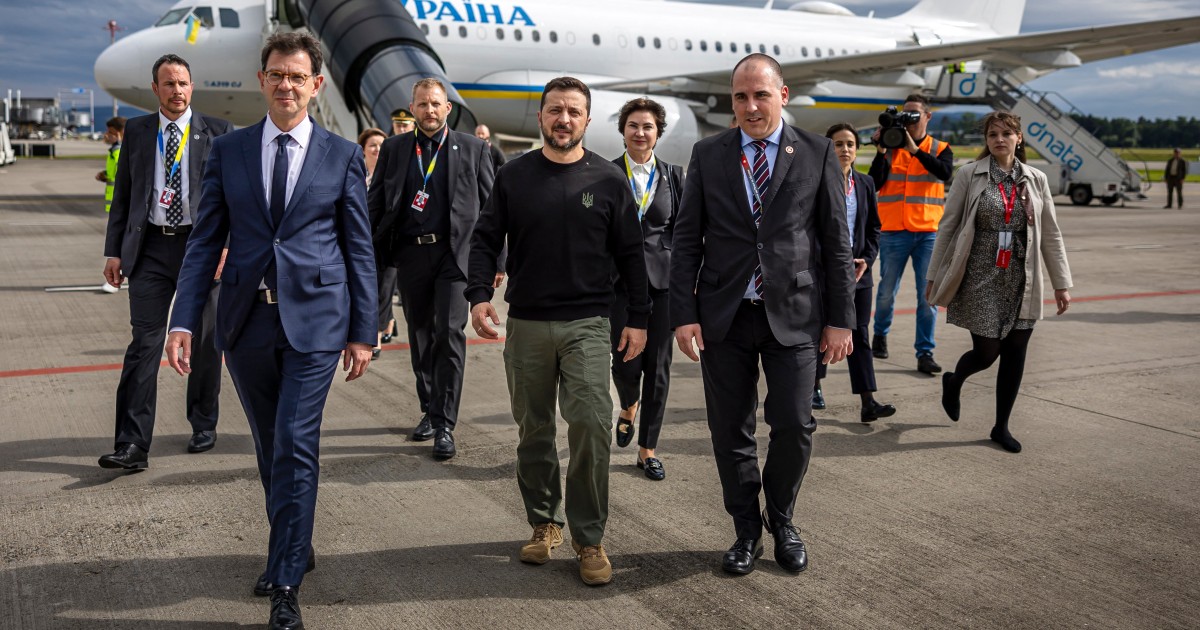GENEVA — Vice President Kamala Harris announced more than $1.5 billion in aid for Ukraine at a conference in Switzerland this weekend that was organized with the aim of plotting out the first steps toward peace in Ukraine.
Harris, standing in for President Joe Biden, said the $1.5 billion included $500 million in new funding for energy assistance and $324 in redirected funds toward emergency energy infrastructure repair.
“These efforts will help Ukraine respond to Russia’s latest attacks on Ukraine energy infrastructure by supporting repair and recovery, improving Ukraine’s resilience to energy supply disruptions, and laying the groundwork to repair and expand Ukraine’s energy system,” Harris’ office said.
More than $379 million from the State Department and the U.S. Agency for International Development will go toward helping millions of people affected by the war, including refugees.
The announcement came after Biden and his counterparts from the wealthiest democratic nations reached a deal Thursday to give Ukraine a $50 billion loan this year backed by frozen Russian assets, signaling a determined commitment to beat back Russia’s invasion, U.S. officials said.
Swiss officials hosting the conference said more than 50 heads of state and government, including Ukrainian President Volodymyr Zelenskyy, were set to join the gathering at the Bürgenstock resort overlooking Lake Lucerne. The presidents of Ecuador, Ivory Coast, Kenya and Somalia joined many Western heads of state and government — with Russia notably absent.
Who will show up — and who will not — had become one of the key stakes of a meeting that critics say will be useless without the presence of Russian President Vladimir Putin’s government, which invaded Ukraine in February 2022 and is pushing ahead with the war.
Turkey and Saudi Arabia have dispatched their foreign ministers while key developing countries like Brazil, an observer at the event, India and South Africa will be represented at lower levels.
China, which backs Russia, joined scores of countries that are sitting out the conference, many of whom have more pressing issues than the bloodiest conflict in faraway Europe since World War II. Beijing says any peace process needs to have the participation of both Russia and Ukraine, and has floated its own ideas for peace.
Zelenskyy recently led a diplomatic push to draw in participants.
Russian troops who now control nearly a quarter of Ukrainian land in the east and south have made some territorial gains in recent months. When talk of a Swiss-hosted peace initiative began last summer, Ukrainian forces had recently regained large swaths of territory, notably near the southern city of Kherson and northern city of Kharkiv.
Against the battlefield backdrop and diplomatic strategizing, summit organizers have presented three agenda items: nuclear safety, such as at the Russia-controlled Zaporizhzhia power plant; humanitarian assistance and exchange of prisoners of war; and global food security — which has been disrupted at times due to impeded shipments through the Black Sea.
That to-do list, encapsulating some of the least controversial issues, is well short of proposals and hopes laid out by Zelenskyy in a 10-point peace formula in late 2022.
The plan includes ambitious calls, including the withdrawal of Russian troops from occupied Ukrainian territory, the cessation of hostilities and restoring Ukraine’s state borders with Russia, including Crimea.
Putin’s government, meanwhile, wants any peace deal to be built around a draft agreement negotiated in the early phases of the war that included provisions for Ukraine’s neutral status and limits on its armed forces, while delaying talks about Russia-occupied areas. Ukraine’s push over the years to join the NATO military alliance has rankled Moscow.
Ukraine is unable to negotiate from a position of strength, analysts say.
“The situation on the battlefield has changed dramatically,” said Alexander Gabuev, director of the Carnegie Russia Eurasia Center, saying that Russia “can’t achieve its maximalist objectives quickly through military means, but it’s gaining momentum and pushing Ukraine really hard.”
“So a lot of countries that are coming to the summit would question whether the Zelenskyy peace formula still has legs,” he told reporters in a call Wednesday.
With much of the world’s focus recently on the war in Gaza and national elections in 2024, Ukraine’s backers want to return focus to Russia’s breach of international law and a restoration of Ukraine’s territorial integrity.
On Friday, Putin called the conference “just another ploy to divert everyone’s attention.”
The International Crisis Group, an advisory firm that works to end conflict, wrote this week that “absent a major surprise on the Bürgenstock,” the event is “unlikely to deliver much of consequence.”
“Nonetheless, the Swiss summit is a chance for Ukraine and its allies to underline what the U.N. General Assembly recognized in 2022 and repeated in its February 2023 resolution on a just peace in Ukraine: Russia’s all-out aggression is a blatant violation of international law,” it said.
Experts say they’ll be looking at the wording of any outcome document, and plans for the way forward. Swiss officials, aware of Russia’s reticence about the conference, have repeatedly said they hope Russia can join the process one day, as do Ukrainian officials.
“Most likely, the three items under review will be endorsed by the participants. But then the big question is, ‘OK, what comes next?’” Gabuev said. “And I don’t think we have a very clear answer to that question yet.”
As leaders headed to the conference venue, the war raged on.
Gov. Vyacheslav Gladkov of Russia’s southern Belgorod region, writing on social media, blamed Ukraine for shelling Friday that struck a five-story apartment building in the town of Shebekino, killing five people. There was no immediate comment from Kyiv.
In Ukraine, shelling killed at least two civilians and wounded eight others on Friday and overnight, regional officials said. Gov. Oleh Syniehubov of the Kharkiv region, which has been the focus of a recent Russian offensive, said one shell fell near a kindergarten while others struck homes.
